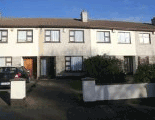Pale to Reduce Anglicisation
28th Jul 2010
Pale to Reduce Anglicisation
Hampton
Court. Shrewsbury Mews. Cedarwood Oaks. Willow Brook. Tuscany Downs.
They might sounds like prim and proper housing estates in a quaint old English country town. The type with lines of scissor trimmed flowerbeds, children practicing their cricket skills on the pristine green with firmly polite signs asking people not to feed the stray cats. The place names suggest The Queen herself might even pop round for afternoon tea.
But this isn't
Cheshire, Cambridge or the Cotswolds. It's Ireland. Dublin town to be specific.
 |
Tuscany Downs, Co. Dublin |
You may not believe that the following sentence could appear under the blood and bandage colours above but the ink (or pixels) here do not lie: The Dubs did something worthwhile this week. More specifically the members of Dublin City Council.
They voted by a large majority to reinforce a previous motion declaring that housing estates and other new developments will be named in the Irish language for the next few years. The significance of this is not that it's some pathetic victory for fáinne waving Gaelgoirí zealously blowing on about the purity of the Gaeltachts and all of us interfering native English speakers wrecking their buzz.
The significance is that it happened in Dublin. The Pale. West Britain.
This isn't a victory for nationalist neo-DeValeraites and the fantasy of an Irish speaking nation either - a sort of self-hating two fingers to our former colonists with the compulsory ban on their language. That's the wrong way to look at it.
The council motion was just about drawing a line in the sand. Or more specifically in the metal signs erected on Dublin's new estates. In short, there's a limit to the amount of England that Ireland should import.
Big name UK department stores that employ tens of thousands of Irish people? Fair enough. Premiership big-money football, Britain's Got Talent and a few harmless soap operas? Yeah grand we'll have a bit of those too. But the widespread adoption of English placenames at the expense of our own? Woah!
 |
Cllr. Críona Ní Dhailigh who presented
the motion to Dublin City Council |
The directive isn't permanent of course and is unfortunately about ten years too late now that we've got more spare housing estates than you could shake a whimpering banker at but this is rightly being described as an opportunity to give our own culture a boost.
Don't let anyone tell you that the next move is to eradicate the history of Joyce, Beckett or any of the highly valuable English language contributions to Irish culture. It's nothing of the sort. We are mature enough as a nation now to know the difference between giving your own culture a gee up and pathetic attempts to stoke sectarianism.
The thinking behind this is to give it a blast for a few years to even out the obsession with Anglicising things but we have to ask the question: why were developers calling their estates by such poncy names in the first place and ignoring local history?
The answer is most
likely because as a nation we perceive certain English names as being more upmarket.
They sound posher. The names made ordinary lines of three bed semis sound far
more prestigious on estate agents adverts thereby justifying higher prices.
It was, like most things during the boom, about money.
Speaking
of grade, the bonus about this little leg-up for Gaelic culture is that there
is virtually no cost attached, something those who rile against the lavish and
often dubious nature of spending money on the language will be happy to hear.
It's not surprising
that this is happening in a recession either. We've started to look at ourselves
a bit closer now that the SUV's with built in headrest cinema screens
and champagne glass holders don't seem such inspiring trophies for life.
Even the
more cynically minded reader will recognise the culture-seeking tourist potential
of a more Irish Ireland. It's what 94% of them want according to Fáilte
Ireland so why not give it to them?
Both Galway city, Dublin city and oddly Navan town are nudging aheadon this front and anyone who was in Croker for the hurling semi-final last weekend will testify that Dirty Aul Town's streets were undeniably thronged with tourists.
As us Rebels made our way as quickly as possible towards the nearest exit to Cork, we wondered if those tourists would ever see the best parts of the island down south.
One wonders
if the members of this county's two local authorities would consider similar
cost-free measures to give this city and county's culture appeal a shot in the
arm.





















